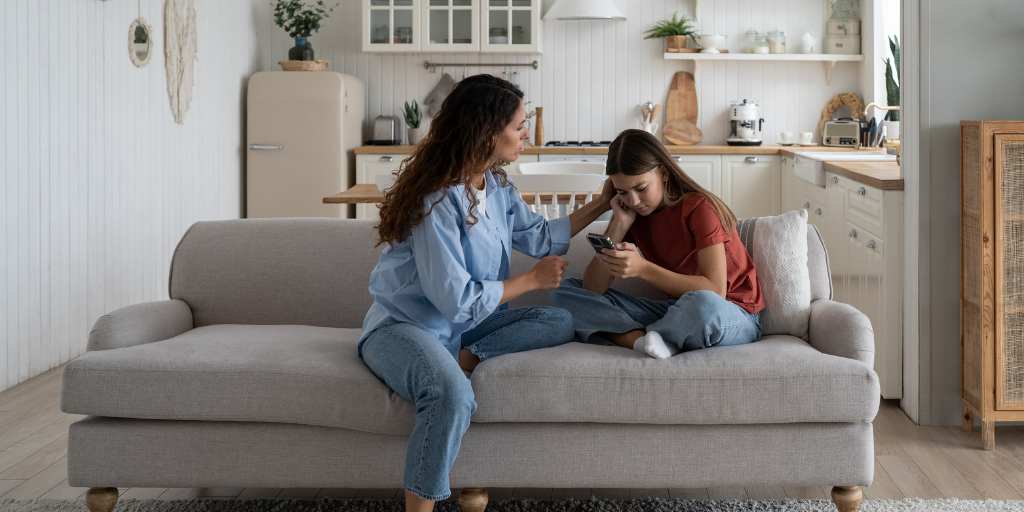
Maybe you’ve heard the warnings that social media impacts your child’s mental health and want to know more. Or perhaps you’ve noticed an increase in anxiety in your kid and wonder if social media could be to blame.
While the causes of issues like anxiety are complex, research shows that social media can be one factor which negatively impacts children’s mental health. In this article, we’ll explore the dangers of social media for youth mental health and what you can do to help them.
If you’re worried about your child’s anxiety, you’re not alone. A recent report from Pew Research Center listed mental health as the greatest concern for parents, with 40% reporting being “extremely” or “very” worried. Pediatricians anecdotally report an uptick in recent years in the number of mental health issues they see in patients.
In many ways, research into the impact of social media on mental health is still in its infancy. But beyond the numbers, the very nature of social media platforms offer clues into possible risks.
Even before social media, tweens and teens often compared themselves to others, struggled to fit in socially, and faced body image issues. As technology has moved much of our social lives online, the way young people interact with others, establish their identities, and navigate peer dynamics has evolved.
Twenty years ago, kids might not know if friends hung out without them. Now, with social media, they can easily find out — and see who else was invited.
While apps like Instagram or Snapchat can be fun, they can also cause stress. One big reason is that people often only post the best parts of their lives. This can make others feel like they're missing out, or that their own lives aren't as great. The pressure to get likes, to look a certain way, or to have as glamorous a life as an internet celebrity can create unattainable standards that kids measure themselves against.
The dark side of online interactions includes cyberbullying, where the anonymity of the internet can embolden negative behavior, subjecting young people to negative comments, rumors, or even coordinated attacks.
Plus, the feeling that kids need to always reply or stay updated can be overwhelming. Seeing too much negative news or feeling alone, even when chatting online, can add to these feelings.
As we navigate this digital age, understanding these dynamics is crucial for supporting our youth.
Here are some red flags that your child may be suffering from social media-related anxiety:
Nicole Baker, assistant professor of psychology at Franklin Pierce University, cites the constant refreshing and checking of social media profiles as a clear sign of social media-related anxiety.
Fear of Missing Out (FOMO) is a phenomenon often associated with social media and one that can lead to anxiety. Kids might express anxiety about being excluded or they may perceive their lives as less exciting than others, which can further lead to negative thoughts.
Does your child agonize over the perfect selfie, or insist that they only post photos showing their life in the most flattering way possible? Baker says that this type of online perfectionism “may indicate or even precede social media-related anxiety.”
Besides behaviors tied to social media, parents should also watch for sudden and extreme behavior changes that are typically linked to mental health issues.
These warning signs include:
If you suspect your child is suffering from social media-related anxiety, here are some tips to help them through it:
While social media might seem trivial to you, it's a significant aspect of your child's social life. By acknowledging its importance without dismissing it, you create an open dialogue, allowing you to encourage reflection and critical thinking about online content.
Creating screen time limits and tech-free zones gives your child respite from things that trigger their anxiety and helps them maintain a healthy balance between their digital and offline lives.
A constant stream of social media notifications can cause anxiety, so disabling alerts and setting time limits on apps can help.
Motivate your child to use their online time for creative activities like making memes or designing games. This mindset shifts the focus away from constant social comparison and promotes a sense of accomplishment.
“Encouraging involvement in offline hobbies and activities that nurture their unique skills and boost self-esteem acts as a protective measure against social media-related stress,” Baker says.
If your child's anxiety is interfering with their daily life, consider seeking a mental health professional for them to speak with. A counselor or psychologist can help your child work through their anxiety and develop skills to help them cope.
You can’t manage what you don’t monitor. Have regular conversations with your child about their internet use and how their social media feeds make them feel. Talk to your child about how social media algorithms work and how they can tailor their feeds to better suit their interests.
Consider using a parental monitoring tool like BrightCanary, which uses AI to alert you if your child encounters anything concerning. You’ll also be able to keep track of their activity on Google, YouTube, and social media, so you can step in when they need extra support.
Social media can contribute to anxiety in kids. Parents should be on the lookout for warning signs and take steps if they suspect their child is suffering from anxiety.
Learn more about how BrightCanary works, and subscribe to our parenting newsletter for weekly tips and resources.